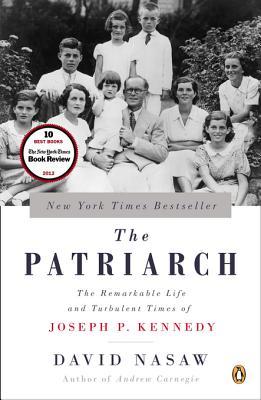
The Patriarch
The Remarkable Life and Turbulent Times of Joseph P. Kennedy
کتاب های مرتبط
- اطلاعات
- نقد و بررسی
- دیدگاه کاربران
نقد و بررسی

October 1, 2012
The father of Jack, Bobby, and Teddy (plus six others) was not a bootlegger, nor does any evidence link him to the Mafia, writes Nasaw, refuting two longstanding rumors. But Joseph P. Kennedy (1888–1969) was possibly the worst U.S. ambassador to Great Britain ever, so committed to appeasing Hitler that FDR cut him out of the diplomatic loop. Kennedy won the post because he was one of the few businessmen to support the New Deal, creator of pioneering financial regulations as the first chairman of the Securities and Exchange Commission. He knew all about manipulating stocks, having parlayed the modest affluence of his father, an East Boston ward heeler, into a fortune in the market. Kennedy was a wonderful father himself, although he and his wife, Rose, led almost completely separate lives. Nasaw (Andrew Carnegie), a history professor at the CUNY Graduate Center, does a fine job of capturing Kennedy’s fiery personality and his eventful, ultimately tragic life, watching Jack rise to the presidency, suffering a stroke but living long enough to see two of his sons assassinated. But the book is much too long and oddly focused; Kennedy’s three-year ambassadorship occupies more than 25% of the text. The reams of fascinating material would have been better served by more careful shaping. Agent: Andrew Wylie, the Wylie Agency.

Starred review from October 15, 2012
Sprawling, highly readable biography of the dynast and larger-than-life figure whose presence still haunts American political life. Working from his subject's extensive archives, Nasaw (Andrew Carnegie, 2006, etc.) pieces together a sometimes-sympathetic, sometimes-critical view of Joseph P. Kennedy (1888-1969), father of John F. Kennedy and most definitely a man of parts. Born into wealth, he learned the ropes in the banking business before heading to Hollywood to try his hand at filmmaking. In the last pursuit, he charted only some successes, but he made great use of the perks of the job in bedding starlets, notably Gloria Swanson. Kennedy left Hollywood to return to finance, moving among several palatial homes in Florida, New York and Massachusetts and building a massive fortune thanks to what Nasaw calls "an almost uncanny knack for being in the right stock." His children, including future politicians John, Robert and Edward, grew up surrounded by opulence, though the patriarch took care that they not become spoiled by too much too soon. Yet, by Nasaw's account, when the Depression hit and reduced his fortune along with everyone else's, Kennedy's mood seemed to turn, and he spent the rest of his long life in brooding and contrarian turns, courting plenty of trouble along the way. Accused, as Nasaw notes, of various crimes and moral failings, ranging from bootlegging to anti-Semitism, Kennedy nevertheless instilled in his family a sense of dedication to service and of the necessity of hard work. As he writes, Jack Kennedy recognized that despite the advantages of wealth, he had obstacles to overcome that were at least due in part to his father: "If I were governor of a large state, Protestant and 55," he said, "I could sit back and let it come to me." It did not, and nothing came easy to any of the Kennedys, that tragic clan, who continue to fascinate. Exhaustive yet accessible, Nasaw's book illuminates.
COPYRIGHT(2012) Kirkus Reviews, ALL RIGHTS RESERVED.

June 1, 2012
Celebrated for his biographies of Andrew Carnegie and William Randolph Hearst, Nasaw takes on Joseph P. Kennedy, businessman, Hollywood mogul, founding chair of the Securities and Exchange Commission, U.S. ambassador to Britain, and, of course, father to our 35th President. He had exclusive access to Kennedy's papers and addresses some longstanding questions.
Copyright 2012 Library Journal, LLC Used with permission.

Starred review from October 15, 2012
What's considered common knowledge about historical figures often gets a biographical rewrite, and to some degree that's what happens in this heavy (literally, sometimes figuratively) look at Joseph Kennedy. When one reads in the introduction that Nasaw was asked by the Kennedy family to write this biography, the obvious question is, How did the request affect the finished product? Nasaw was granted access to papers denied to other researchers and worked for six years on the project. Some of his conclusions clash markedly with what has been written about Kennedy (Nasaw dismisses rather lightly the long-held conclusion that Joe made part of his fortune as a bootlegger). But he gives readers a much fuller look at various accusations made against Kennedy, especially the charge that he was an anti-Semite. Through quoted letters, it is clear that Kennedy did have a grudge against the Jews, mostly because they interfered with what he wanted, be it getting a foothold in the movie industry or keeping the U.S out of WWII. His isolationism never really wavered. He believed that victory over Hitler had cost much and accomplished little. Perhaps the key element to Kennedy, Nasaw suggests, is that rather than being larger than life, he was much smaller. He was all about protecting his family and his fortune. Though fortune remained, the family shattered, cutting Kennedy, in many ways, adrift. The book becomes more fascinating the farther one gets into it, and while there may be areas for dispute here, there's no doubt it makes a major contribution to Kennedy history.(Reprinted with permission of Booklist, copyright 2012, American Library Association.)

























دیدگاه کاربران